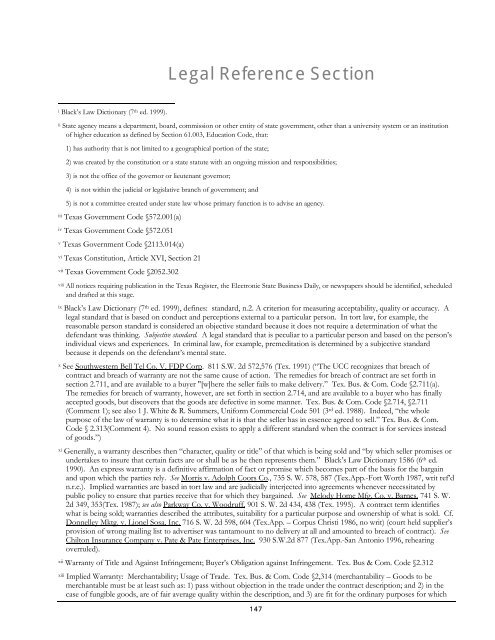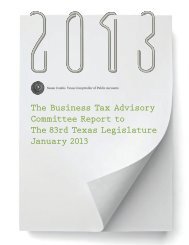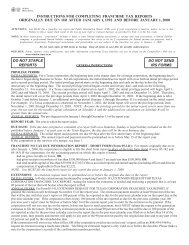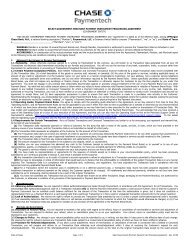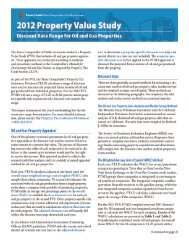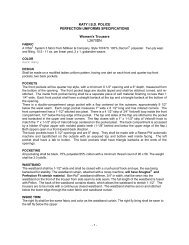Contracts Management Guide - Texas Comptroller of Public Accounts
Contracts Management Guide - Texas Comptroller of Public Accounts
Contracts Management Guide - Texas Comptroller of Public Accounts
You also want an ePaper? Increase the reach of your titles
YUMPU automatically turns print PDFs into web optimized ePapers that Google loves.
i Black’s Law Dictionary (7 th ed. 1999).<br />
Legal Reference Section<br />
ii State agency means a department, board, commission or other entity <strong>of</strong> state government, other than a university system or an institution<br />
<strong>of</strong> higher education as defined by Section 61.003, Education Code, that:<br />
1) has authority that is not limited to a geographical portion <strong>of</strong> the state;<br />
2) was created by the constitution or a state statute with an ongoing mission and responsibilities;<br />
3) is not the <strong>of</strong>fice <strong>of</strong> the governor or lieutenant governor;<br />
4) is not within the judicial or legislative branch <strong>of</strong> government; and<br />
5) is not a committee created under state law whose primary function is to advise an agency.<br />
iii <strong>Texas</strong> Government Code §572.001(a)<br />
iv <strong>Texas</strong> Government Code §572.051<br />
v <strong>Texas</strong> Government Code §2113.014(a)<br />
vi <strong>Texas</strong> Constitution, Article XVI, Section 21<br />
vii <strong>Texas</strong> Government Code §2052.302<br />
viii All notices requiring publication in the <strong>Texas</strong> Register, the Electronic State Business Daily, or newspapers should be identified, scheduled<br />
and drafted at this stage.<br />
ix Black’s Law Dictionary (7 th ed. 1999), defines: standard, n.2. A criterion for measuring acceptability, quality or accuracy. A<br />
legal standard that is based on conduct and perceptions external to a particular person. In tort law, for example, the<br />
reasonable person standard is considered an objective standard because it does not require a determination <strong>of</strong> what the<br />
defendant was thinking. Subjective standard. A legal standard that is peculiar to a particular person and based on the person’s<br />
individual views and experiences. In criminal law, for example, premeditation is determined by a subjective standard<br />
because it depends on the defendant’s mental state.<br />
x See Southwestern Bell Tel Co. V. FDP Corp. 811 S.W. 2d 572,576 (Tex. 1991) (“The UCC recognizes that breach <strong>of</strong><br />
contract and breach <strong>of</strong> warranty are not the same cause <strong>of</strong> action. The remedies for breach <strong>of</strong> contract are set forth in<br />
section 2.711, and are available to a buyer "[w]here the seller fails to make delivery.” Tex. Bus. & Com. Code §2.711(a).<br />
The remedies for breach <strong>of</strong> warranty, however, are set forth in section 2.714, and are available to a buyer who has finally<br />
accepted goods, but discovers that the goods are defective in some manner. Tex. Bus. & Com. Code §2.714, §2.711<br />
(Comment 1); see also 1 J. White & R. Summers, Uniform Commercial Code 501 (3 rd ed. 1988). Indeed, “the whole<br />
purpose <strong>of</strong> the law <strong>of</strong> warranty is to determine what it is that the seller has in essence agreed to sell.” Tex. Bus. & Com.<br />
Code § 2.313(Comment 4). No sound reason exists to apply a different standard when the contract is for services instead<br />
<strong>of</strong> goods.”)<br />
xi Generally, a warranty describes then “character, quality or title” <strong>of</strong> that which is being sold and “by which seller promises or<br />
undertakes to insure that certain facts are or shall be as he then represents them.” Black’s Law Dictionary 1586 (6 th ed.<br />
1990). An express warranty is a definitive affirmation <strong>of</strong> fact or promise which becomes part <strong>of</strong> the basis for the bargain<br />
and upon which the parties rely. See Morris v. Adolph Coors Co., 735 S. W. 578, 587 (Tex.App.-Fort Worth 1987, writ ref’d<br />
n.r.e.). Implied warranties are based in tort law and are judicially interjected into agreements whenever necessitated by<br />
public policy to ensure that parties receive that for which they bargained. See Melody Home Mfg. Co. v. Barnes, 741 S. W.<br />
2d 349, 353(Tex. 1987); see also Parkway Co. v. Woodruff, 901 S. W. 2d 434, 438 (Tex. 1995). A contract term identifies<br />
what is being sold; warranties described the attributes, suitability for a particular purpose and ownership <strong>of</strong> what is sold. Cf.<br />
Donnelley Mktg. v. Lionel Sosa, Inc. 716 S. W. 2d 598, 604 (Tex.App. – Corpus Christi 1986, no writ) (court held supplier’s<br />
provision <strong>of</strong> wrong mailing list to advertiser was tantamount to no delivery at all and amounted to breach <strong>of</strong> contract). See<br />
Chilton Insurance Company v. Pate & Pate Enterprises, Inc. 930 S.W.2d 877 (Tex.App.-San Antonio 1996, rehearing<br />
overruled).<br />
xii Warranty <strong>of</strong> Title and Against Infringement; Buyer’s Obligation against Infringement. Tex. Bus & Com. Code §2.312<br />
xiii Implied Warranty: Merchantability; Usage <strong>of</strong> Trade. Tex. Bus. & Com. Code §2,314 (merchantability – Goods to be<br />
merchantable must be at least such as: 1) pass without objection in the trade under the contract description; and 2) in the<br />
case <strong>of</strong> fungible goods, are <strong>of</strong> fair average quality within the description, and 3) are fit for the ordinary purposes for which<br />
147


